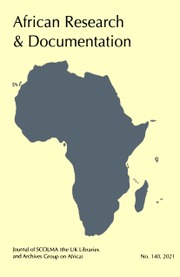No CrossRef data available.
Article contents
Unnatural Selection? The Political Materials Collections in the Institute of Commonwealth Studies
Published online by Cambridge University Press: 25 April 2022
Extract
The Commonwealth political ephemera collection was begun in 1960-1961 with material continuing to be collected up to the present day. The Commonwealth Political Party, Trades Union and Pressure Group Materials collection consists of over 13,000 items from more than sixty countries, including most Commonwealth member nations, and from some of the Overseas Territories of the UK. There is also a substantial amount of material from some countries before they became independent (such as Rhodesia and Nyasaland). For periods where countries left the Commonwealth material continued to be collected, most significantly for the purposes of this paper in the case of South Africa. In addition there is a small amount of material from countries (for example Angola) that are neither Commonwealth members nor were British colonies, but were colonies of other European imperialist countries.
- Type
- Research Article
- Information
- Copyright
- Copyright © African Research & Documentation 2005
Footnotes
[This paper was given as part of the panel on “Libraries, archives and the construction of (historical) knowledge: interrogating British holdings of archives and ephemera on twentiethcentury Africa” at “Debating Africa” African Studies Association of the UK Biennial Conference, Goldsmiths College, University of London, September 13th-15th, 2004




